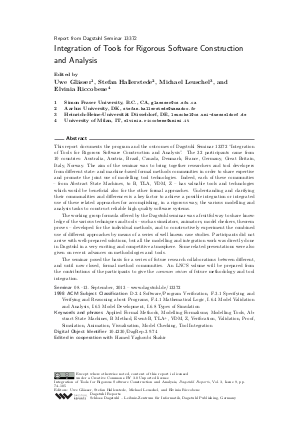Integration of Tools for Rigorous Software Construction and Analysis (Dagstuhl Seminar 13372)
Authors Uwe Glässer, Stefan Hallerstede, Michael Leuschel, Elvinia Riccobene and all authors of the abstracts in this report
-
Part of:
Issue:
Dagstuhl Reports, Volume 3, Issue 9
Part of: Volume: Dagstuhl Reports, Volume 3
Part of: Journal: Dagstuhl Reports (DagRep) - License:
 Creative Commons Attribution 3.0 Unported license
Creative Commons Attribution 3.0 Unported license
- Publication Date: 2014-01-06
File

PDF
DagRep.3.9.74.pdf
- Filesize: 0.96 MB
- 32 pages
Document Identifiers
Subject Classification
Keywords
- Applied Formal Methods; Modelling Formalisms; Modelling Tools; Abstract State Machines; B Method; Event-B; TLA+; VDM; Z; Verification; Validation; Proof; Simulation; Animation; Visualisation; Model-Checking; Tool Integration
Metrics
- Access Statistics
-
Total Accesses (updated on a weekly basis)
0PDF Downloads0Metadata Views
Abstract
This report documents the program and the outcomes of Dagstuhl Seminar 13372 "Integration of Tools for Rigorous Software Construction and Analysis". The 32 participants came from 10 countries: Australia, Austria, Brazil, Canada, Denmark, France, Germany, Great Britain, Italy, Norway. The aim of the seminar was to bring together researchers and tool developers from different state- and machine-based formal methods communities in order to share expertise and promote the joint use of modelling tool technologies. Indeed, each of these communities -- from Abstract State Machines, to B, TLA, VDM, Z -- has valuable tools and technologies which would be beneficial also for the other formal approaches. Understanding and clarifying their commonalities and differences is a key factor to achieve a possible integration or integrated use of these related approaches for accomplishing, in a rigorous way, the various modelling and analysis tasks to construct reliable high quality software systems. The working group formula offered by the Dagstuhl seminar was a fruitful way to share knowledge of the various techniques and tools -- such as simulators, animators, model checkers, theorem proves -- developed for the individual methods, and to constructively experiment the combined use of different approaches by means of a series of well known case studies. Participants did not arrive with well-prepared solutions, but all the modelling and integration work was directly done in Dagstuhl in a very exciting and competitive atmosphere. Some related presentation were also given on recent advances on methodologies and tools. The seminar posed the bases for a series of future research collaborations between different, and up to know closed, formal method communities. An LNCS volume will be prepared by the contributions of the all participants to give the common vision of future methodology and tool integration.
Cite As Get BibTex
Uwe Glässer, Stefan Hallerstede, Michael Leuschel, and Elvinia Riccobene. Integration of Tools for Rigorous Software Construction and Analysis (Dagstuhl Seminar 13372). In Dagstuhl Reports, Volume 3, Issue 9, pp. 74-105, Schloss Dagstuhl – Leibniz-Zentrum für Informatik (2014)
https://doi.org/10.4230/DagRep.3.9.74
BibTex
@Article{glasser_et_al:DagRep.3.9.74,
author = {Gl\"{a}sser, Uwe and Hallerstede, Stefan and Leuschel, Michael and Riccobene, Elvinia},
title = {{Integration of Tools for Rigorous Software Construction and Analysis (Dagstuhl Seminar 13372)}},
pages = {74--105},
journal = {Dagstuhl Reports},
ISSN = {2192-5283},
year = {2014},
volume = {3},
number = {9},
editor = {Gl\"{a}sser, Uwe and Hallerstede, Stefan and Leuschel, Michael and Riccobene, Elvinia},
publisher = {Schloss Dagstuhl -- Leibniz-Zentrum f{\"u}r Informatik},
address = {Dagstuhl, Germany},
URL = {https://drops.dagstuhl.de/entities/document/10.4230/DagRep.3.9.74},
URN = {urn:nbn:de:0030-drops-43584},
doi = {10.4230/DagRep.3.9.74},
annote = {Keywords: Applied Formal Methods; Modelling Formalisms; Modelling Tools; Abstract State Machines; B Method; Event-B; TLA+; VDM; Z; Verification; Validation; Proof; Simulation; Animation; Visualisation; Model-Checking; Tool Integration}
}
